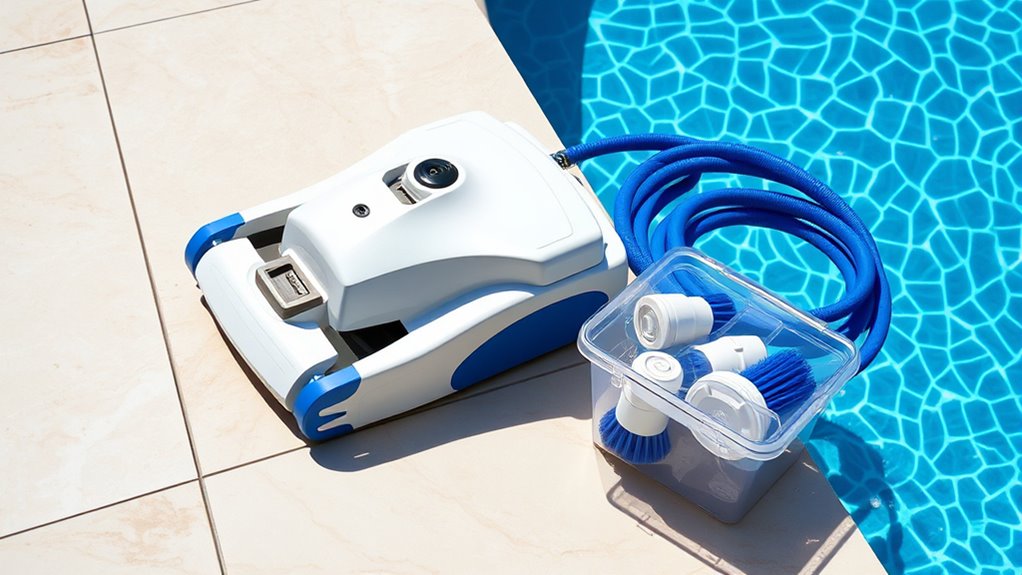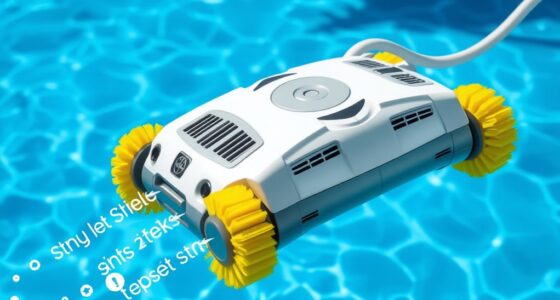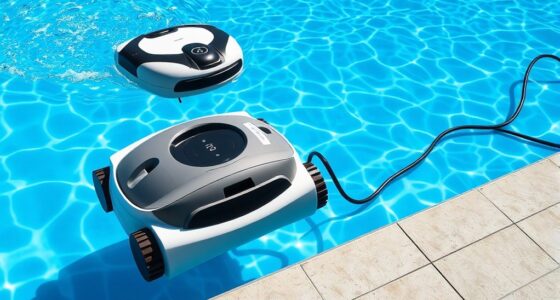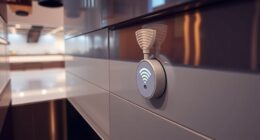To keep your automatic pool cleaner working efficiently, you’ll want to clean its brushes, filters, and wheels after each use, making sure to remove debris and rinse with fresh water. Store it in a cool, dry place only when completely dry, and remove batteries separately. Regular inspections and preventative maintenance help prevent issues, while following manufacturer guidelines guarantees ideal performance. For detailed steps to maximize your cleaner’s lifespan, explore the full process inside.
Key Takeaways
- Remove debris and rinse brushes, filters, and wheels after every use to prevent grime buildup.
- Regularly clean filters and check for wear to maintain optimal suction and energy efficiency.
- Ensure the cleaner is fully dry and batteries are stored separately in a cool, dry place before storing.
- Inspect electrical components and replace worn parts proactively to prevent malfunctions.
- Store in a cool, shaded environment away from chemicals and extreme temperatures to prolong device lifespan.

Keeping your automatic pool cleaner in top condition is essential for its performance and longevity. Regular robotics maintenance ensures it runs smoothly, efficiently, saving you time and money in the long run. When you maintain your cleaner properly, you help preserve its energy efficiency, which is crucial for keeping operating costs low. Proper cleaning and storage routines prevent breakdowns and extend the life of your device, so you can enjoy hassle-free pool maintenance season after season.
Start by inspecting your cleaner after each use. Remove debris, such as leaves, twigs, and dirt, from the brushes, filters, and brushes. Rinsing these parts with fresh water helps eliminate any built-up grime that could hinder performance. Pay special attention to the brushes and wheels, as tangled hair or debris can impair movement and reduce cleaning efficiency. Regularly cleaning the filter basket or cartridge ensures optimal water flow and suction, which directly impacts the cleaner’s energy efficiency. When filters are clogged, your cleaner has to work harder, using more energy and increasing wear on its motor. Additionally, cleaning or replacing filters as recommended by the manufacturer can help maintain maximum suction power and filtration effectiveness. Routine maintenance also includes checking for signs of wear or damage, such as cracks or worn brushes, and replacing parts as needed. This proactive approach helps prevent more serious issues down the line, keeping your device operating at peak performance. Incorporating preventative maintenance practices can further enhance the longevity of your device. Regularly inspecting and maintaining the electrical components can also prevent unexpected malfunctions during operation. Incorporating proper electrical care can safeguard your device against common electrical issues.
When it’s time to store your automatic pool cleaner, proper procedures are crucial. Always ensure it’s completely dry before storing it away, as moisture can cause mold, corrosion, or electrical problems. Remove batteries, if applicable, and store them in a cool, dry place separate from the main unit. Keep the cleaner in a cool, shaded area, away from direct sunlight, extreme temperatures, or chemicals that could degrade parts over time. Proper storage not only preserves the cleaner’s structural integrity but also maintains its energy efficiency for future use. Following manufacturer guidelines for cleaning and storage can further help prolong your automatic pool cleaner’s lifespan. Ensuring the environment where you store your cleaner is free from extreme temperatures and chemicals will help maintain its optimal condition over the long term.
Frequently Asked Questions
How Often Should I Replace the Filter in My Pool Cleaner?
You should replace the filter in your pool cleaner according to its filter maintenance and replacement schedule. Typically, check the filter weekly and replace it every 1 to 3 months, depending on usage and debris buildup. Regular inspections help guarantee peak cleaning performance. If you notice reduced suction or clogs, it’s time to replace the filter sooner. Proper maintenance keeps your pool cleaner working efficiently and prolongs its lifespan.
Can Automatic Pool Cleaners Be Used in Saltwater Pools?
Did you know that over 70% of saltwater pools use automatic cleaners? Yes, you can use your cleaner in saltwater pools, but check for saltwater compatibility first. Salt can cause corrosion, so maintenance requirements include rinsing the cleaner after use and inspecting for damage regularly. Ensuring your cleaner is designed for saltwater helps it last longer and keeps your pool pristine without extra hassle.
Are There Eco-Friendly Cleaning Options for Automatic Pool Cleaners?
You’re wondering if eco-friendly alternatives exist for automatic pool cleaners. Yes, you can choose models designed to use biodegradable cleaning agents and energy-efficient features. Look for cleaners that operate with minimal power and avoid harsh chemicals, reducing environmental impact. Using eco-friendly options helps protect your pool’s ecosystem while keeping it clean. By selecting these alternatives, you contribute to a healthier planet without sacrificing performance or cleanliness.
How Do I Troubleshoot Connectivity Issues With Robotic Pool Cleaners?
Think of your robotic pool cleaner’s Wi-Fi as a delicate dance partner. If you face connectivity issues, first check for signal interference from nearby electronic devices. Make certain your Wi-Fi signal is strong and within range. Restart your router and the cleaner. Update firmware if needed. These steps help restore harmony, so your cleaner gracefully navigates your pool again, free of connection hiccups and ready for a spotless swim.
What Safety Precautions Should I Take During Cleaning and Storage?
When cleaning and storing your pool equipment, prioritize electrical safety by unplugging devices before handling. Wear protective gear to prevent chemical exposure, especially when dealing with pool chemicals. Make certain the area is dry to avoid electrical hazards, and follow manufacturer instructions carefully. Store cleaners in a cool, dry place away from chemicals and direct sunlight. These precautions help keep you safe and prolong the life of your pool equipment.
Conclusion
Regularly cleaning and storing your automatic pool cleaner extends its lifespan and keeps your pool sparkling. Did you know that neglecting proper maintenance can reduce your cleaner’s efficiency by up to 30%? By dedicating just a few minutes after each use, you ensure it works effectively whenever you need it. Proper care not only saves you money on repairs but also guarantees a cleaner, healthier pool season after season.









